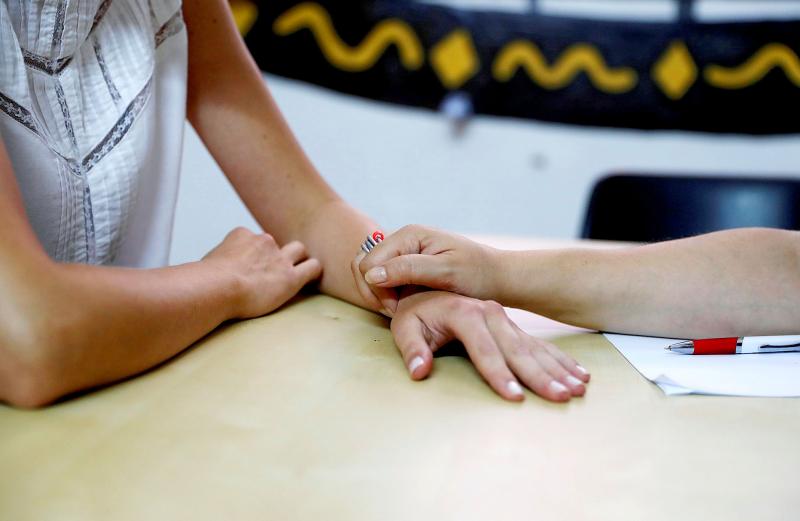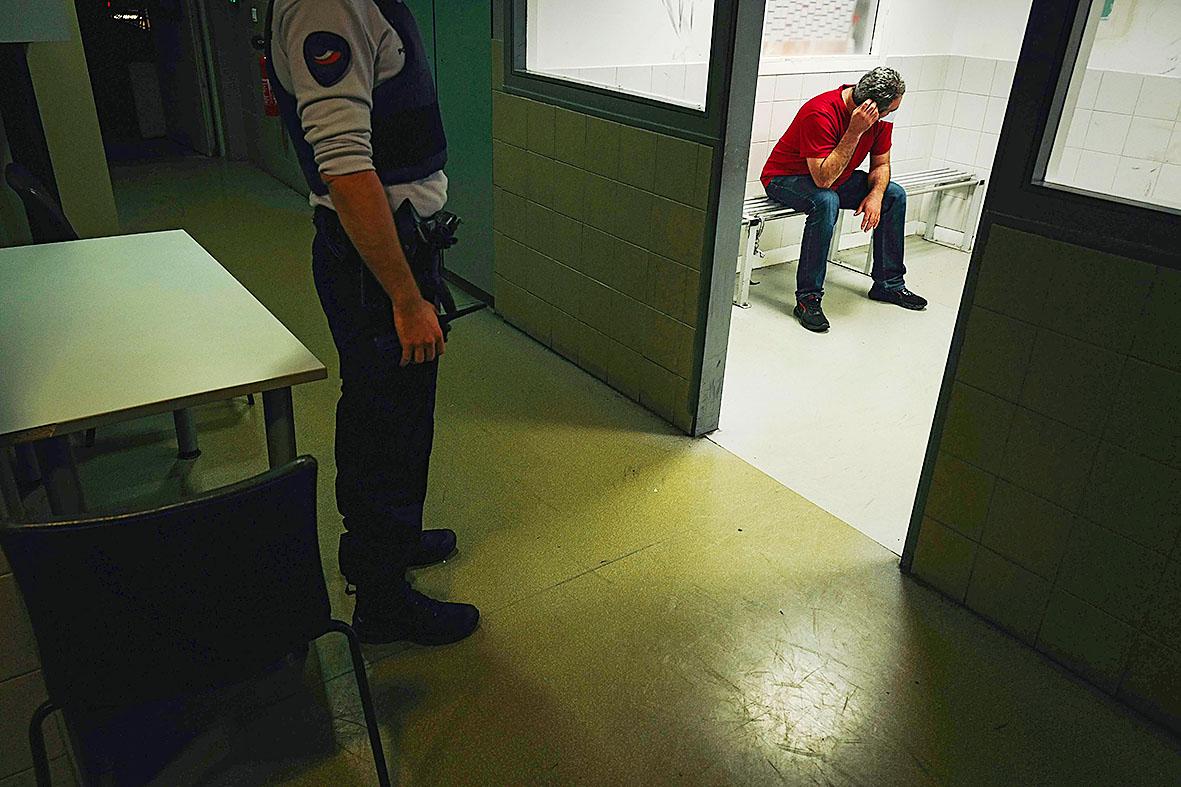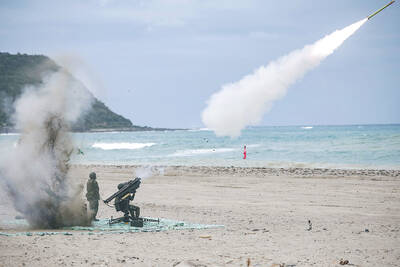Matiu Brokenshire once threw an axe at his partner in anger. Today, the 45-year-old works with a service credited with stopping hundreds of domestic violence cases in New Zealand, helping other men like him.
The 0800 Hey Bro hotline has provided advice to about 2,000 abusive men and linked them to other services to stop them harming their partners.
“I started the journey to uncover my own trauma,” said Brokenshire, who also works with New Zealand Police on tackling family violence.

Photo: Reuters
“I grew up in a world where this was normal. My mother used to strap me when I was a child and hit me. I was a victim of domestic violence for years,” he said.
Brokenshire, who is indigenous Maori and has a son with his former partner, said he struggled with his violent behavior and drug addictions — until he got help eight years ago.
“When I met my son’s mum, she was an angry, broken person and in the first three months, I had committed violence against her. Then it became weekly,” he added.

Photo: AFP
Since starting a new chapter, he has joined a growing number of men, some of them ex-abusers, working to stop domestic violence in New Zealand.
‘HORRIFIC’ RECORD
New Zealand has long had a progressive reputation and was the first nation to give women the right to vote in 1893.
But women’s rights campaigners say sexism, drug and alcohol addictions, poverty and exposure to violence as a child have all contributed to a poor record on domestic violence.
Police investigated more than 133,000 family harm cases in 2018, the latest year for which data is available, and were called out to respond to a family violence incident every four minutes.
“Domestic violence is one of the biggest problems we have in New Zealand and we know it affects educational outcomes and creates mental health problems,” said Janet Fanslow, an expert on family violence.
“We haven’t got our heads around prevention,” said Fanslow, an associate professor at the University of Auckland who is working on a government-funded study of 3,000 men and women.
“All we have invested in this moment is response. We are still waiting for people to get hurt. We need to recognize the importance of engaging men as they are mostly the perpetrators.”
There were 230 family violence deaths between 2009 and 2017, official data shows, half of them caused by an intimate partner.
A government-commissioned report in April cited limited support and a lack of professionals to deal with abusive men as among the reasons why violence continues — a gap that some former abusers are now trying to fill.
“Nobody is working with perpetrators,” said Lua Maynard, 56, who runs anger management programmes for men who are ordered by the courts to undergo rehabilitation.
“When men perpetrate violence, they ask the men to get away, and support the victims. But men also need support.”
Maynard, who was previously charged for hitting his partner, called for efforts and solutions to uncover factors that could have led to a man’s violent behavior, such as childhood trauma, abuse and unemployment.
“You can’t recover if you haven’t uncovered those issues,” he said.
Prime Minister Jacinda Ardern had said New Zealand’s record of family violence is “horrific,” and her government has introduced a slew of measures to end the problem.
In May, it announced an allocation of NZ$200 million (US$132 million) over the next four years for frontline services working on family violence issues.
In 2018, New Zealand joined a handful of nations that passed a law granting domestic violence survivors 10 days of paid leave to give them time to leave their partners, such as finding new homes or attending court hearings.
Women often lose their jobs when they flee domestic abuse, while many stay with abusive partners due to financial concerns, according to women’s rights campaigners.
BOYS can CRY
The April report studied nearly 100 cases of abuse by men in which one partner died. It found most had sought help previously, but support services missed warning signs and opportunities to stop the violence.
The study, by an independent group that advises the government on reducing family violence, recommended greater support services for both women and men.
“We do feel it is important to reach out to men, and that there is work to be done in that space,” said spokeswoman Susan Barker at Women’s Refuge, a Wellington-based advocacy group that runs safe houses for women and their children.
“There are organizations that do this, perhaps not enough, and many of these could use further funding,” she added.
Others say it should all start from promoting gender equality and tackling male stereotypes, to stop domestic abuse.
The White Ribbon Campaign, a global group of men and boys seeking to end violence against women, launched a social media campaign recently, urging men to reject stereotypes such as ‘boys don’t cry’ and ‘toughen up.’
“We flipped those ideas of masculinity on its head and ran campaigns that said, it’s ok to cry — open up or be the man you want to be,” said Rob McCann, New Zealand manager for White Ribbon.

In late October of 1873 the government of Japan decided against sending a military expedition to Korea to force that nation to open trade relations. Across the government supporters of the expedition resigned immediately. The spectacle of revolt by disaffected samurai began to loom over Japanese politics. In January of 1874 disaffected samurai attacked a senior minister in Tokyo. A month later, a group of pro-Korea expedition and anti-foreign elements from Saga prefecture in Kyushu revolted, driven in part by high food prices stemming from poor harvests. Their leader, according to Edward Drea’s classic Japan’s Imperial Army, was a samurai

The following three paragraphs are just some of what the local Chinese-language press is reporting on breathlessly and following every twist and turn with the eagerness of a soap opera fan. For many English-language readers, it probably comes across as incomprehensibly opaque, so bear with me briefly dear reader: To the surprise of many, former pop singer and Democratic Progressive Party (DPP) ex-lawmaker Yu Tien (余天) of the Taiwan Normal Country Promotion Association (TNCPA) at the last minute dropped out of the running for committee chair of the DPP’s New Taipei City chapter, paving the way for DPP legislator Su

It’s hard to know where to begin with Mark Tovell’s Taiwan: Roads Above the Clouds. Having published a travelogue myself, as well as having contributed to several guidebooks, at first glance Tovell’s book appears to inhabit a middle ground — the kind of hard-to-sell nowheresville publishers detest. Leaf through the pages and you’ll find them suffuse with the purple prose best associated with travel literature: “When the sun is low on a warm, clear morning, and with the heat already rising, we stand at the riverside bike path leading south from Sanxia’s old cobble streets.” Hardly the stuff of your

Located down a sideroad in old Wanhua District (萬華區), Waley Art (水谷藝術) has an established reputation for curating some of the more provocative indie art exhibitions in Taipei. And this month is no exception. Beyond the innocuous facade of a shophouse, the full three stories of the gallery space (including the basement) have been taken over by photographs, installation videos and abstract images courtesy of two creatives who hail from the opposite ends of the earth, Taiwan’s Hsu Yi-ting (許懿婷) and Germany’s Benjamin Janzen. “In 2019, I had an art residency in Europe,” Hsu says. “I met Benjamin in the lobby